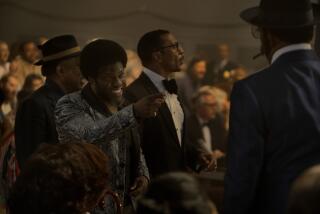Romanticizing ‘The General’
- Share via
Though he’s been dead only four years, Dublin gangster Martin Cahill is taking his place alongside Jesse James, Billy the Kid and Clyde Barrow as movie heroes from the wrong side of the law. Cahill became known as the General, and through the eyes of writer-director-producer John Boorman he takes on almost mythic qualities.
Boorman, a native of England who has lived in Ireland for more than two decades, followed the much-publicized exploits of Cahill, as he and his gang pulled off everything from cheap arcade robberies to jewelry heists to the daring burglary of a private collection of art masterworks. Along the way, Cahill embarrassed the Irish police and, in refusing to share his loot with political factions in the north, made mortal enemies of both the IRA and the loyalists.
Cahill’s murder in 1994, which opens and closes “The General,” was claimed by the IRA.
Boorman has a personal interest in Cahill. He has said in interviews that his home was one of Cahill’s targets and that among his burgled possessions was a gold album given to him for the “Dueling Banjos” song in “Deliverance” (which Boorman directed). Without mentioning the homeowner’s name, “The General” reenacts that burglary and uses the gold album as a symbol of Cahill’s comically distorted view of the collapse of social values in the republic. Talk about converting a loss to a win.
“The General” has been both a big hit and a big target in Ireland, where Cahill was seen more as a cleverly elusive, self-gratifying thug than as a lovable rogue. Cahill did make goats of the unarmed police, which made for good newspaper reading, but his gang also brutalized its victims, and, in one audacious act of violence, crippled a key witness in a Cahill trial with a car bomb.
The film includes that car bomb incident, and another horrific scene where Cahill nails one of his gang member’s hands to a pool table, thinking the man had stolen from him. In both instances, the violence segues quickly into humor, with scenes that feel designed to immunize Cahill from audience enmity.
Boorman signals that he may not like what the real Cahill did, but as a storyteller with a proven affection for larger-than-life subjects, he can’t resist him, either. Cahill is a screenwriter’s dream, part Michael Corleone, part Archie Bunker, a blue-collar godfather who uses intimidation and paternalism in equal measure, and follows, with fevered devotion, a skewed moral framework of his own invention.
Cahill doesn’t smoke, drink, use drugs or cheat on either of the women--wife Frances (Maria Doyle Kennedy) and her younger sister Tina (Angeline Ball)--who share his bed and his brood. He’s a good husband, dad and provider, whose hobby is raising pigeons, whose only vice (besides crime, of course) is pastries and who never returns from a night shift without a Santa-sized sack of stolen toys for his kids.
If you can forgive his romanticized nature, Cahill is a great role, and Brendan Gleeson, a robust Irish actor best known in the U.S. as Mel Gibson’s sidekick in the film “Braveheart,” has a high time playing it. He’s a big man with the facial expressions of an imp, portraying Cahill as a mischievous man-child, at play in the field of the gang lords.
Cahill’s cat-and-mouse game with the cops, especially its chief investigator (Jon Voight, with a flawless accent), is depicted as an extension of the rambunctious urchin (Eamonn Owens) shown in early flashbacks, a product of the oppressed Dublin projects and a would-be victim of a predatory reform school priest.
That run-in with the priest has the look of myth-making to it, and it certainly sets up all subsequent authority figures for the gangster’s showcased pranks. Cahill’s real victims may be unamused by his scamp-hero image, but it’s classic storytelling. As a John Ford character famously said in “The Man Who Shot Liberty Valence”: “When the legend becomes a fact, print the legend.”
* MPAA rating: R for violence and pervasive language. Times guidelines: It’s a tough, violent movie, not for young audiences.
‘The General’
Brendan Gleeson: Martin Cahill
Adrian Dunbar: Noel Curley
Jon Voight: Ned Kenny
Maria Doyle Kennedy: Frances Cahill
Sony Pictures Classics presents a Merlin Films production. Produced and directed by John Boorman. Screenplay by Boorman and Paul Williams, based on the novel “The General.” Executive producer Kieran Corrigan. Original music Richie Buckley. Cinematographer Seamus Deasy. Costume design Maeve Paterson. Production design Derek Wallace. Editor Ron Davis. Running time: 2 hours.
More to Read
Only good movies
Get the Indie Focus newsletter, Mark Olsen's weekly guide to the world of cinema.
You may occasionally receive promotional content from the Los Angeles Times.










